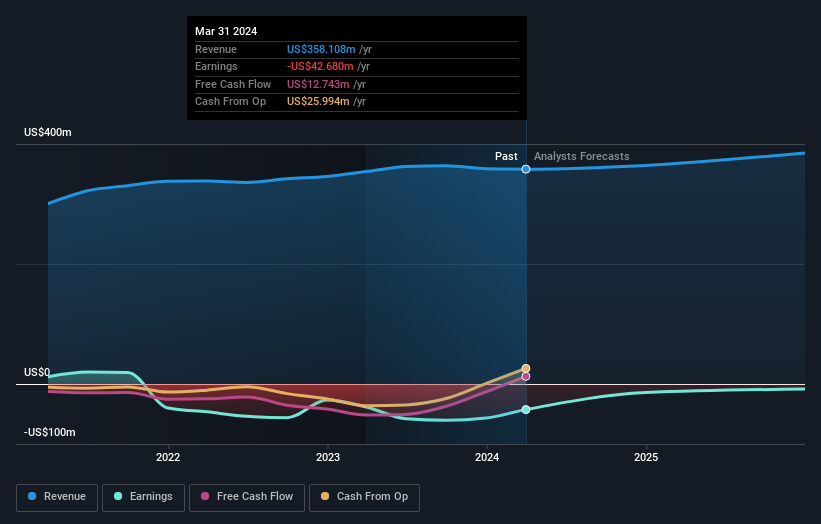FARO Technologies, Inc. (NASDAQ:FARO) Analysts Are Pretty Bullish On The Stock After Recent Results
A week ago, FARO Technologies, Inc. (NASDAQ:FARO) came out with a strong set of first-quarter numbers that could potentially lead to a re-rate of the stock. Results overall were credible, with revenues arriving 3.9% better than analyst forecasts at US$84m. Higher revenues also resulted in lower statutory losses, which were US$0.38 per share, some 3.9% smaller than the analysts expected. Earnings are an important time for investors, as they can track a company's performance, look at what the analysts are forecasting for next year, and see if there's been a change in sentiment towards the company. So we collected the latest post-earnings statutory consensus estimates to see what could be in store for next year.
See our latest analysis for FARO Technologies
Taking into account the latest results, FARO Technologies' two analysts currently expect revenues in 2024 to be US$364.3m, approximately in line with the last 12 months. Losses are predicted to fall substantially, shrinking 66% to US$0.75. Before this earnings announcement, the analysts had been modelling revenues of US$364.2m and losses of US$0.75 per share in 2024.
The consensus price target rose 9.8% to US$28.00, with the analysts increasing their valuations as the business executes in line with forecasts.
Another way we can view these estimates is in the context of the bigger picture, such as how the forecasts stack up against past performance, and whether forecasts are more or less bullish relative to other companies in the industry. One thing stands out from these estimates, which is that FARO Technologies is forecast to grow faster in the future than it has in the past, with revenues expected to display 2.3% annualised growth until the end of 2024. If achieved, this would be a much better result than the 1.4% annual decline over the past five years. Compare this against analyst estimates for the broader industry, which suggest that (in aggregate) industry revenues are expected to grow 6.1% annually for the foreseeable future. So although FARO Technologies' revenue growth is expected to improve, it is still expected to grow slower than the industry.
The Bottom Line
The most obvious conclusion is that the analysts made no changes to their forecasts for a loss next year. On the plus side, there were no major changes to revenue estimates; although forecasts imply they will perform worse than the wider industry. There was also a nice increase in the price target, with the analysts clearly feeling that the intrinsic value of the business is improving.
Following on from that line of thought, we think that the long-term prospects of the business are much more relevant than next year's earnings. At least one analyst has provided forecasts out to 2025, which can be seen for free on our platform here.
And what about risks? Every company has them, and we've spotted 1 warning sign for FARO Technologies you should know about.
Have feedback on this article? Concerned about the content? Get in touch with us directly. Alternatively, email editorial-team (at) simplywallst.com.
This article by Simply Wall St is general in nature. We provide commentary based on historical data and analyst forecasts only using an unbiased methodology and our articles are not intended to be financial advice. It does not constitute a recommendation to buy or sell any stock, and does not take account of your objectives, or your financial situation. We aim to bring you long-term focused analysis driven by fundamental data. Note that our analysis may not factor in the latest price-sensitive company announcements or qualitative material. Simply Wall St has no position in any stocks mentioned.

 Yahoo Finance
Yahoo Finance 
